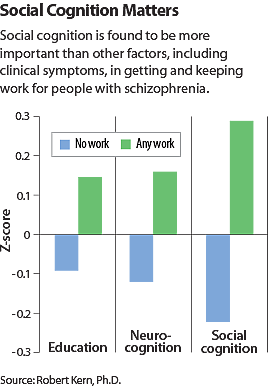Social cognition—the ability to comprehend and appropriately respond to social interactions—appears to be among the most important variables in achieving successful employment for people with schizophrenia.
In fact, social cognition was found to be more important than basic neurocognition and clinical symptoms, according to a study presented in a poster session at the International Congress on Schizophrenia Research in Orlando, Fla., by Felice Reddy, Ph.D., a postdoctoral fellow in the Department of Psychiatry and Biobehavioral Science at UCLA.
“Social cognition has become increasingly popular over the last 10 years as an important variable in understanding schizophrenia,” principal investigator Robert Kern, Ph.D., told Psychiatric News in an interview at the congress. “It includes the cognitive abilities and processes involved in understanding human interaction, perceptions of others and their emotions, and what is known as ‘theory of mind’—the ability to think about what another individual is thinking, based on cues in the social environment.
“These are abilities that most people take for granted, but in schizophrenia we know now that social cognition is one of the key areas of dysfunction,” Kern said. “In the work I have been doing for 10 years, one of the primary aims has been to identify variables that distinguish those who are successful in finding work from those who are not successful.
“In this study, we found that the one variable that distinguished workers from nonworkers was social cognition,” said Kern. He is a research professor at UCLA and at the Department of Veterans Affairs VISN22 Mental Illness Research, Education, and Clinical Center in Los Angeles.
Kern, Reddy, and colleagues analyzed data on 74 veterans (68 men, six women) who met SCID-based DSM-IV criteria for schizophrenia or schizoaffective disorder and were enrolled in the Greater Los Angeles VA Healthcare Center’s supported-employment program.
Following their enrollment in the supported-employment program and signing informed consent for participation in the study, veterans received a baseline clinical and neurocognitive assessment using the MATRICS Consensus Cognitive Battery (MCCB). The MCCB is a battery of cognitive assessments developed by the Measurement and Treatment Research to Improve Cognition in Schizophrenia, a UCLA project funded by the National Institute of Mental Health, one goal of which is to standardize protocols for studying cognition.
Veterans then worked with their employment specialist to attain a community-based job or enrollment in an educational program if that was their choice.
Researchers were trying to learn what the determinants of employability and work outcome among veterans with schizophrenia were and what relative contributions to employability were made by demographics, symptoms, neurocognition, and social cognition.
Thirty-nine percent of the study participants got competitive jobs or were engaged in transitional work experiences. Of those who obtained work, only 50 percent maintained employment for longer than 10 weeks. An additional 4 percent were enrolled in college courses.
The researchers assessed seven domains tested by the MCCB, and of these, social cognition stood out as the largest predictor of employment or educational enrollment. They then assessed several demographic variables (age, gender, education) as well as symptomatology, neurocognition, and social cognitive abilities as predictors. Although not reaching statistical significance, social cognition was the only variable reflecting a unique contribution to employability.
Kern said that the ability to interact socially, even at a minimal level, is key to maintaining employment. “Employers will say [of a patient], ‘Well, he does the work O.K., but I don’t really know what’s going on with him. He never talks to me or other workers, and during a break he just goes off by himself.’ And the patients will say, ‘The work is O.K., but I don’t really feel comfortable around the other workers, and I definitely don’t want to talk to my supervisor.’ ”
He cited the example of one individual whose car broke down but who was terrified of calling his supervisor to explain; four days went by, he never showed up at work, and he was fired.
Reddy said that while cognitive remediation, and especially social cognition training, is not widely disseminated as a treatment in community practice, clinicians should take note. “It is so important for clinicians and patients to be aware of difficulties with social cognition as a potential obstacle, as well as the usefulness of cognitive remediation or social cognition training in obtaining and maintaining successful employment,” she said.
A daylong “satellite” meeting on cognition took place prior to the start of the congress, reflective of the importance of the subject in the schizophrenia research community. And many researchers emphasized the importance of “bridging” cognitive skills training to real-world situations faced by patients, particularly in the workplace. A number of programs have emerged in which cognitive and social cognition training are embedded within supported-work programs.
Kern emphasized the importance to successful bridging strategies of a clinician who knows the patient well. “Cognitive skills training needs to be tied to real work-a-day problems encountered by the patient,” he said. “But that’s a moving target unless you have someone working with the patient on a regular basis.” ■

